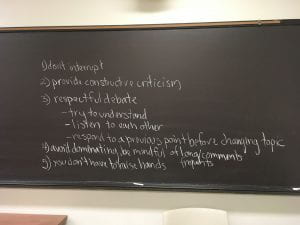On December 9, 2020, Remote Humanities and Academic Technology Solutions (ATS) co-hosted the panel, Social Annotation: Tools for Teaching Reading in the Humanities and Social Sciences, to highlight the perspectives of three instructors in both the Humanities and Social Sciences Divisions who have extensive experience using Hypothesis in their online teaching following last Spring’s rapid transition to online teaching and learning environments.
Miller Prosser (Associate Director, Digital Studies Program / Humanities Division), and Hervé Reculeau (Associate Professor, Oriental Institute, Near Eastern Languages and Civilizations, and the College / Humanities Division), and Jennifer Spruill (Senior Lecturer and Co-Chair, “Power, Identity, Resistance” Sequence / Social Sciences Collegiate Division).
If you couldn’t make it to our lively panel and Q&A session, don’t fret, we’ve got some highlight reels for you here.
Why Use Hypothesis
The first video offers responses from our panelists on the affordances they’ve identified with Hypothesis.
Hypothesis Implementation
The second video offers a greater sense of the process of implementing Hypothesis, including any challenges the instructors faced in their usage of Hypothesis.
In brief, our panelists emphasize the benefits of introducing Hypothesis in their courses, including its environment for collaborative problem-solving, greater accessibility to annotate their texts, and an overall boost in reading comprehension–whether it’s creating the space for students to more easily work through difficult texts, or read and think more deeply about a less challenging text. While technical hiccups are expected in the implementation of new technologies, all three panelists have noted that any challenges faced in implementing Hypothesis have been due to external obstacles (i.e. the OCR scanning on PDFs).
While Hypothesis has largely become popular on our campus as a response to the shift to online teaching and learning, it is clear that Hypothesis has the potential to be a lasting educational tool even after returning to primarily face-to-face instruction.
Further Questions? Want to Start Using Hypothesis?
ATS operates a campus-wide pilot for Hypothesis, as currently integrated into Canvas. By joining the pilot, you will gain access to an exclusive Canvas site full of resources to support your usage and exploration of Hypothesis as a new teaching tool. For more information, or to join the pilot, click the Join the Pilot form.
Attend an Upcoming Getting Started with Hypothes.is Workshop through ATS
Workshop Details: 10:00 – 10:30am on March, 5, 19 and April 2, 2021
This thirty-minute workshop provides an introduction to the collaborative annotation tool Hypothes.is, its principal technical features, and key pedagogical considerations for designing social annotation activities and assignments in remote and hybrid teaching. In this session, you will learn about the variety of documents and materials Hypothes.is supports, how to enable and use the Hypothes.is integration in your Canvas course site, tools for preparing documents for Hypothes.is activities, and possible pedagogical frames for these activities.


